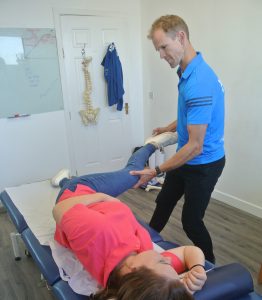What is Plantar Fasciitis and what can be done about it?
What is Plantar Fasciitis?
Plantar fasciitis is probably the most common form of heel pain that we see here in the clinic.
It involves inflammation and degeneration of the thick tissue that runs along the sole of the foot. This usually presents as pain to the inside and central aspects of the heel as well as being felt along the length of the arch.

This can take from 3 – 12 months to recover from with the vast majority of people having full resolution in under 6 months. In the clinic, we tend to find that most cases will resolve within 2 – 4 months depending on the severity of the initial injury.
One of the most common symptoms is sharp pain felt in the heel. This will first occur early in the morning and this will generally ease after you walk for a few minutes. It is also quite common for pain to be experienced when you start walking or running. The pain will ease as you warm up but will return again at rest.
As it develops, you will begin to feel pain when standing on the feet for a prolonged amount of time. The pain in the heel will not ease when you are walking or running for a few minutes.
Factors such as being overweight, increases in running distances and running load or the amount of time spent on the feet (starting a new waitressing or manual labour job) are all possible causes of this injury.
How can Plantar Fasciitis be treated?
Initially, we would treat this by decreasing the pressure on the heel, taping and gel heel pads can be effective for this. Ensuring the person is wearing supportive footwear that is not too narrow for the foot (avoid too much time in flip flops, high heels or poorly supported runners) is also important. Avoiding hard surfaces or walking barefoot can be effective in the early phases of the injury.
Orthotics can be useful if there’s an underlying foot issue that could be significantly impacting the injury. For feet with severe fallen arches for example or significant osteoarthritis in foot, orthotics can help to facilitate certain foot movements. From experience, this is definitely not the most important factor to address for the vast majority of people.
Despite what advertisements try to suggest about orthotics ‘’resolving’’ plantar fasciitis, we would suggest that this is only a fraction (if even) of the overall treatment plan. Orthotics are probably unnecessary for the vast majority of clients.

At APC, what we have found that trumps orthotics for resolution of heel pain, is a well structured progressive rehabilitation plan.
This will help to identify where there are weaknesses in the lower limb and hip and look to re-address this balance.
We would also spend time monitoring and adjusting your training/loading schedule and potentially addressing weight issues if needed also.
Should I just rest it and stretch it out?
Quite simply put……NO! As intuitive as this may seem, we must avoid prolonged resting as this can cause the plantar fascia to become stiffer and result in increased pain levels. It’s all about finding the right balance of activity and rehab that is going to create positive adaptation for you.
As with most injuries, there may be a few bumps in the road in terms of pain being felt but these instances should become less frequent and less intense as you progress through your plan.
In most cases, unless the injury is in a more advanced stage, we can generally have you continue walking and running but at a reduced rate. We will monitor and progressed this as you continue to increase strength and mobility of the plantar fascia and surrounding muscles, specific to your injury.

For runners, as well as trying to ‘’bulletproof’’ the fascia and surrounding musculature, we would also look at your running form. We can make some simple suggestions to try out if there was anything that looked like it needed addressing. Examples include using more heel strike if your constantly running on the toes or slightly widening stance if you are with the legs too close together. This can be hard to self diagnose and this is where the guidance of an experienced practitioner can be helpful in addressing this.
So if your heel pain is long standing or just recently onset, take the right first step (excuse the pun!) and call us today on 025 35015 or 021 7011252 and get on the road to recovery from this potentially frustrating injury.